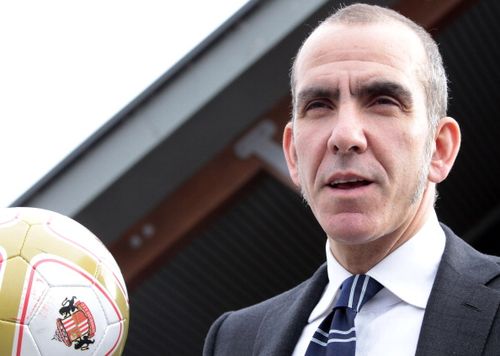
Paolo di Canio and the 'Strongman' Theory

In what many assumed to be an April Fools’ story, Sunderland appointed former West Ham forward and Swindon manager Paolo di Canio as their new manager.
The appointment of a ‘self-confessed fascist’ has been met by outrage from Sunderland’s vice-chairman, former MP David Miliband, and sections of the media. The Daily Mail have continued their tradition of trolling the nation while displaying no hint of self-awareness by focusing on his fascism in their back page lead; Dan Hodges, a Telegraph blogger who hilariously refers to himself as a “Blairite cuckoo in the Miliband nest” has called for Sunderland to be boycotted.
di Canio is often described as an admirer of Mussolini, who he’s previously described as “a very principled individual”. I’m not particularly knowledgeable about Mussolini – the most obscure things I know about him are that he had more than one syphilitic mistress; that he commissioned a headquarters with a giant replica of his own face; and that he didn’t actually make the trains run on time. All of which are vaguely interesting, but don’t really address the matter of whether he was well-intentioned – I think I’m pretty safe in assuming that his bad reputation was more or less deserved. Even so, the fact that di Canio has spoken about admiring the man but not his actions, raises his beliefs from the level we tend to associate with the ‘f’ word.
Let’s look at the issue from a slightly different angle.
Supposing a manager was to express admiration for the intent of the BNP, which in his view were strengthening British culture but disapproved of the aim of achieving this by deporting foreigners. As far as I understand it, that isn’t far from how di Canio thinks – admiring a vile man, but disapproving of his vile actions. Weird certainly, to the point of being nearly inexplicable. But nothing worthy of a boycott.

Nothing’s straightforward with this guy.
I’ve read that, amongst the reasons for Silvio Berlusconi being repeatedly been voted into power, Italy was paralysed by complex tax laws, casual corruption and entangled in bureaucracy prior to his first national election. In Russia, after the chaos of the Yeltsin years, many Russians romanticised communism as a time when things simply worked – a reason for Putin having the levels of support he has.
It seems that one of the answers to the seemingly inexplicable question of why Berlusconi keeps getting elected is that many Italians are relieved to hand over power to someone who ‘gets things done’. While it may not make sense on a logical level, it’s plausible that a large portion of the population may partially admire Mussolini for the same reasons.
My understanding of di Canio’s psychology (more an abstract feeling, from reading between the lines of stories on his childhood poverty and dealing with panic attacks in his youth, than any direct quote) is that he associates fascism more with community, hard work, and demanding leaders. In contrast to the deeply political figure painted by some, he’s said that he hasn’t voted for 14 years as “Italian politicians – all of them – think only about themselves, and making money.”
Admittedly, my interpretation of di Canio comes more from an abstract sense than any direct quote. But just because a man associates himself with one particular label doesn’t mean he believes in everything associated with it.
That Telegraph blogger defines himself as a Blairite – I think David Miliband does the same. To me, being a Blairite means deceiving the public, glossing over complexity, showing no respect to the opponent, painting oneself as being on a messianic mission to bring about a golden future. Miliband and Hodges would presumably disagree, in the same way I think di Canio would disagree over the common interpretation of fascism.
I’m not sure it’s even that clear that di Canio does admire Mussolini. To quote a section from his autobiography, translated by the Independent:
“I am fascinated by Mussolini. I think he was a deeply misunderstood individual. He deceived people. His actions were often vile. But all this was motivated by a higher purpose. He was basically a very principled individual. Yet he turned against his sense of right and wrong. He compromised his ethics.”
That sounds like mixed support at worst, maybe even an intellectual fascination.
You might be aware that di Canio has a tattoo of the word ‘dux’, a shortened version of Il Duce, Mussolini’s nickname. But the phrase translates literally to ‘leader’ – perhaps an expression of his belief in the concept, rather than total support of Mussolini? If nothing else, his ‘support’ of Mussolini becomes less clear-cut after reading that quote. Fascination and support aren’t necessarily the same thing.
Cristiano Lucarelli isn’t attacked for the crimes committed in the Soviet gulags, and while di Canio’s case is a little muddier, it’s not necessarily totally different. (Slightly off-topic, but Hodges quotes that same translation. Except he misses out the last two sentences – in classic New Labour style spinning the facts to support his argument.)
David Miliband, as a backbench MP, voted in support of the Iraq War. In 2010, he continued to insist that war was justified given the strength of evidence, a full four years after the ludicrousness of the main source’s exaggeration was in the public domain. In contrast to Miliband’s blind obedience and wilful ignorance, di Canio’s political views have led to no-one’s deaths.
His views cause me discomfort at best. I’m not totally sure why he’s fascinated by Mussolini, or how far he believes him to have strayed from the morally defensible. But if you asked me which of the two men I feel the most moral outrage towards, Miliband would win by a vastly overwhelming majority.

He even does the Blair hand gestures! Courtesy of CarmeCH
Di Canio’s actions as Swindon manager show that he believes in the concept of the ‘strongman’ leader, a central, iconic figure who can be relied on to act quickly, decisively, and strongly for the good of the group.
Only a few games into his time at Swindon, di Canio wouldn’t compromise after Leon Clarke refused to come in for extra training following a defeat, loaning out a striker who’s now second top-scorer a division higher.
Removing England U19 keeper Wes Foderingham and describing him as “the worst professional I’ve ever seen” grabbed attention. But more notable is the fact he stripped League 2 Team of the Year right-back Paul Caddis of the captaincy and forced him out of the club as punishment for having “changed his attitude” in pre-season… following the birth of his son.
To most of us, even if it’s true, it’s an understandable mental flaw, the kind of trap we’d expect players to fall into from time to time. To di Canio, it was unacceptable.
To understand di Canio the manager, you must understand one vital truth – nothing less than absolute, total commitment is acceptable, and if he judges you to have failed to reach those standards, there appears to be no way back.
Brian Clough’s managerial style was definitely in the same tyrant/strongman role that di Canio’s has so far been. Though even Clough didn’t go as far as subbing off his first choice keeper for a bad 20 minutes. But Clough’s strangest motivational techniques – punching Nigel Jemson in the stomach among them – would be just as easy to mock were they carried out by a young manager without the reputation of genius attached. di Canio has claimed that his Swindon players had one day off in his first 49 in charge, working double sessions for most of that time. The line from di Canio’s idealised vision of Mussolini to his own demanding managerial standards is fairly easy to see.
A motivator could be what the Mackems need. There’s a definite sense of lethargy to Sunderland’s play this season, with Fletcher and McClean dragging the team through large stages of the season. Decent players like Larsson, Sessegnon and Johnson have offered far less than they’re capable of, so there would have been a definite logic to appointing di Canio until the end of the season. But it’s a massive gamble to give a two-and-a-half year contract to a manager who’s unproven at the top level and only has a year-and-a-half of management experience.
One of the much-repeated arguments against a Premier League team appointing di Canio has been that the big egos in the Premiership will be harder to deal with. I think his biggest hurdle comes at a more practical level.
If, at Swindon, di Canio decides to sell an outstanding right-back for no good reason, then there’ll be literally hundreds of players around the world of a similar or better standard. It’d be difficult to bring in one of them for a reasonable price, but given the sheer number available, not impossible. If di Canio falls out with a key player at Sunderland in the same way, there’s likely to only be dozens of better players in the world, three quarters of them well out of Sunderland’s reach, one or two of the remainder with a huge price tag.

di Canio’s new workplace. Courtesy of Rach
I don’t want to give the impression I believe di Canio’s political beliefs are whiter than white. In Italy and Germany, certain types of far-right parties are illegal, out of the understandable fear that dangerous fools believe such horrible belief systems are their nation’s path back to global domination.
But I’m relatively confident that di Canio doesn’t believe in the more odious aspects of fascism, even if his choice of label is troubling. On a practical level, his management methods go too far in the direction of the strongman – there was definitely room for a compromise to be reached with Paul Caddis.
Generally, I don’t want managers who draw attention to themselves. I don’t agree with the oft-repeated assertion that Jose Mourinho is ‘a great character’ who ‘makes the game more interesting’. I’d prefer managers to be pretty dull on the outside with their teams providing the entertainment. But whereas most ‘colourful’ managers deliberately draw attention to themselves, di Canio seems a genuine lunatic.
His management should be fun to watch.